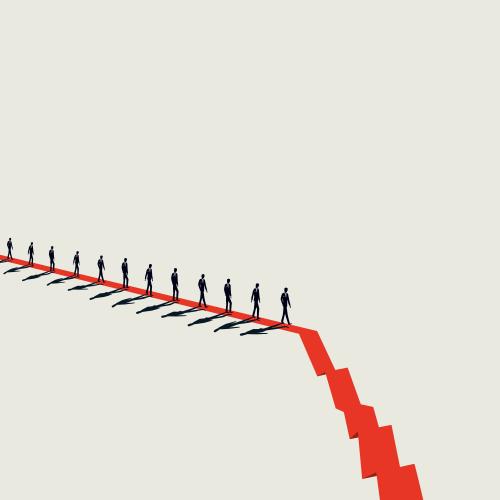The United States has experienced stagnant or even declining intergenerational economic mobility since the 1980s. At the same time, income inequality remains high, both within and across race groups. As we recover from the COVID-19 recession, which led a staggering 22 million Americans to lose their jobs, it is more important than ever to understand the role that job displacement plays in exacerbating income inequalities and intergenerational income mobility.
While we know that job displacements lead to large and lasting negative effects on earnings, it’s not clear if the impact varies across workers with different demographic and socioeconomic characteristics. In our report, we explore the effect of a job displacement on earnings by a worker’s race, education level, and parental income. We consider a worker to be displaced if they involuntarily lose a full-time job that they held for at least two years. There are two dimensions along which workers could be differentially affected by job displacements – the earnings effect of a given displacement and the frequency with which workers experience them. We explore both in our report.
The effect on earnings is consistent across all displaced workers…
All workers, regardless of their demographic or socioeconomic characteristics, seem to experience similar negative shocks to their earnings following a displacement. In Figure 1, we show the impact of a job displacement on log annual earnings by parental income level. In our report, we also show the effects by race and education level. In all cases, we arrive at the same conclusion; job displacements negatively impact workers’ annual earnings similarly across demographic and socioeconomic groups.

…But not all workers are displaced equally
In any given year, approximately two percent of all workers in the United States experience a job displacement. However, Black workers, those without a bachelor’s degree, and those with low-income parents experience displacements at much higher rates than their white, degree-holding, and high-income-parents peers. In Figure 2 we show that from 1989 to 2019, certain groups of workers have experienced much higher probabilities of being displaced in a given year.

Black workers are 67 percent more likely to be displaced than their white peers, on average. At the same time, workers without a bachelor’s degree are also 67 percent more likely to be displaced than those with a bachelor’s degree. Meanwhile, workers whose parents are in the bottom half of the income distribution are 27 percent more likely to be displaced than those with parents in the top half.
Would policies that affect displacement affect income inequality and intergenerational mobility?
All workers suffer profound immediate and long-term earnings effects when they are displaced. However, workers who are Black, less-educated, and who come from lower-income families are more likely to be displaced in a given year, meaning they are more likely to experience the negative earnings effects of job displacements. Therefore, policy efforts to mitigate the likelihood of displacement and its adverse effects on earnings may play a role in reducing income inequality and improving intergenerational mobility.
Kristin Butcher is Vice President and Director of Microeconomic Research at the Federal Reserve Bank of Chicago. The views expressed are those of the authors and do not necessarily represent the views of the Federal Reserve Bank of Chicago, the Board of Governors of the Federal Reserve System, or its staff.
The Brookings Institution is financed through the support of a diverse array of foundations, corporations, governments, individuals, as well as an endowment. A list of donors can be found in our annual reports published online here. The findings, interpretations, and conclusions in this report are solely those of its author(s) and are not influenced by any donation.
The Brookings Institution is committed to quality, independence, and impact.
We are supported by a diverse array of funders. In line with our values and policies, each Brookings publication represents the sole views of its author(s).






Commentary
Job displacements hurt workers across the board
July 21, 2022